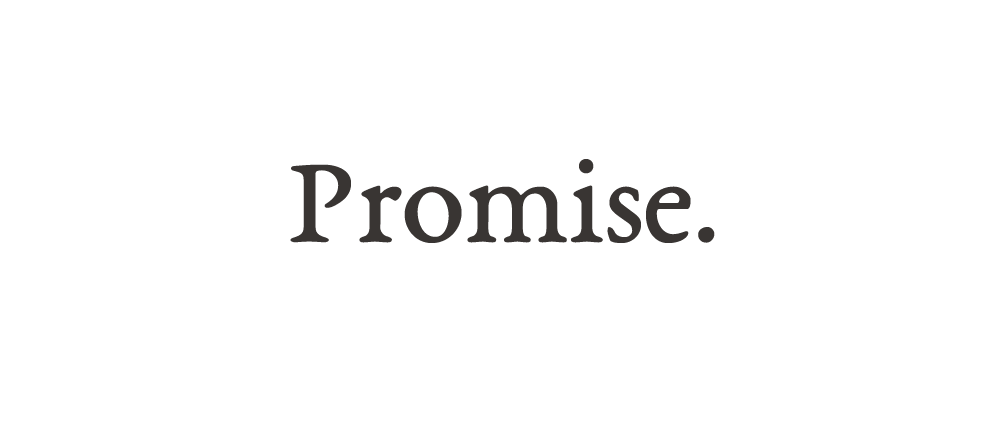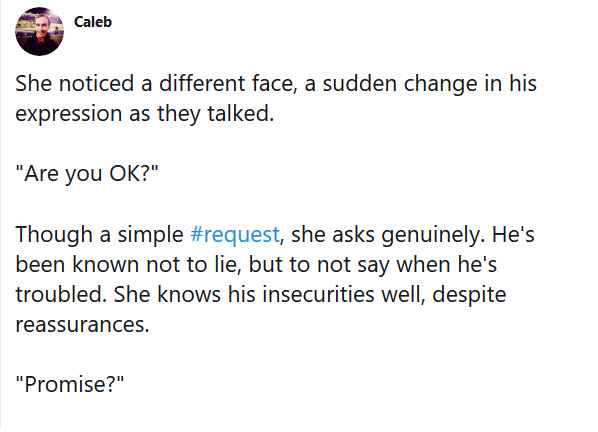Promise.
The power of one word.

Everyone has a favorite color. At least, that's what ice breakers would have you believe. Any time a new group or class is formed, from the time we are children to university and probably beyond, "What's your favorite color?" is a common ice breaker question. But not everyone has a favorite word. Writers are one of the few exceptions. While those who partake in the creative liberties of manipulating the English language to do their bidding may have slightly larger vocabularies than their non-words-obsessed counterparts, they do have a greater tendency to have a favorite word. Like a color, a favorite word might be something that evokes a good feeling, image, or memory. It might be a fun word to use because of its spelling, meaning, pronunciation, or rarity. Or, very simply, that word could hold a special meaning by association with very personal life events.
Sometimes, though, words are special because they contain power. When spoken, they convey deeper meaning, hold a deeper purpose, and play a significant role in the life of the person.
For me, "promise" is one of those words.

This tweet was my submission for the #vss365 word prompt for February 10, 2020. The prompt was the word "request," but the key word in the whole story is the ending question: "Promise?"
This little tweet was more than just a little story. It actually happened.
It was mid-January 2020. I was having dinner with one of my best friends. I had not seen her since early November 2019. Whenever we meet, we tend to talk for a while. We ended up talking for three and a half hours that evening. During our conversation, as she was telling me things, she paused and asked if everything was OK. She said I had a sudden change in expression that seemed like I was troubled. I had not noticed or intentionally changed my expression. I was intently listening to her. I told her I was fine, which I was. Her immediate reply was the key word: "Promise?"
The word promise is defined as "an express assurance on which expectation is to be based" (Dictionary.com). Another definition is "to assure (someone) of the authenticity or inevitability of something" (The Free Dictionary). I see a promise as a form of a vow. To give a promise is to (in a way) make a vow that what was said is true, without question, even if searched. To promise is to say, "I am a person of integrity, and my word is my law and cannot be broken." It takes a lot of trust for me to give a promise to someone. It's not something I say lightly.
When it comes to my close friends, however, it is used without concern. I'm still careful in what I make a promise about, but it's not a secret word or something I never say. In my discourse with this small circle has two common cases where the word comes up have developed. The first is when I make a promise, such as saying I can be reached at any of time of the day or night. If they want me, they can reach me. I don't care what time it is. I will be there. And that's a promise. The other is when I ask them something and I confirm it with a "Promise?"
This takes us back to my friend. Normally, I am the one asking her this question. Suddenly, she turns around and asks me. It was a bit surprising. Even though she's my friend, I did not expect her or anyone else to have picked up this little thing I do and return to me. It showed more clearly than ever that she cares about me. After all, she literally spoke my language to demonstrate that. It really made me appreciate her even more than I already do.
This little exposition into my life and the word "promise" reminds me of God's promises to us. In His word, He has given us many promises. There is a whole category of 365 day devotional books comprised solely of God's promises. And the best part of all these promises is they are all true and cannot be broken.
While I am merely human and eventually will break a promise (though hopefully not intentionally), God is perfect and cannot break His word. Jesus says in Luke 21:33 that "Heaven and earth will pass away, but my words will never pass away." (NIV). In Exodus 24:12-13, God commands Moses to come up Mount Sinai to receive "the tablets of stone with the law and commandments I have written for their instruction." (NIV). Later, in Exodus 32:15-16, Moses descends the mountain holding two stone tablets, each one identical, containing the law of God.
In those days, it was customary for the two parties involved in a contract or vow to both receive a copy of the terms. In this manner, both parties could be held accountable should something go wrong. In fact, we still draw up and distribute contracts, lease agreements, and other binding documents this way. Though we may no longer see the second copy due to technology increasingly being used to fill out such forms, you can be assured you are the not the only one holding a copy of the terms.
When Moses came down the mountain, according to "legal law," he should have only held one copy. Yet he held both. That's because God didn't need a copy. He wrote the law and cannot violate it, for He is perfect and in Him is no wrongdoing (1 John 1:5).
Hebrews 6:13-17 talks about God making a promise to Abraham, and when He did, "because He could swear by no one greater, He swore by Himself" (6:13, NKJV). There was and there is nobody greater than God, so He swore by Himself, who is the greatest. In doing so, it made His promise infallible and unbreakable because His word is true.
God is not a man, that He should lie,
Nor a son of man, that He should repent.
Has He said, and will He not do?
Or has He spoken, and will He not make it good?
(Numbers 23:19, NKJV)
There are times I have trouble believing. There are times I ask probably too many questions and try to understand life using logic rather than taking His promises by faith. I'm doing a bit of that right now. Graduation is next month, which puts me out of a job temporarily and I've not found a new job yet. I wanted to at least try to go on some sort of summer trip but with the COVID-19 pandemic currently sweeping the nation, that's increasingly looking less likely. Questions about various aspects of my future are filling my head like a flash flood. It's very easy for me to overthink and build up my anxiety in times like these.
But this attribute of God, a promise maker whose promises are sure and will never become void, is something I cling to and do my best to cling to more. Because no matters what happens, no matter what I think, no matter who says "yes" or "no," God's promises are always "yes" and always "amen." Whenever I'm stressed or concerned, He turns around and speaks the truth of the matter, ending it with a "I promise."
And that's the beauty of it all. Just as I confirm with my friends and just as my friend confirmed with me, so God confirms with me. He assures me that He already has and always had a plan for my future. He reminds me that it is Him who works all things out, not me, and He'll do it perfectly. It's His seal of certainty, His binding signature on a contract. It's His peace being given to me in a language I understand.
He promises.
Featured image: https://counterpractice.tumblr.com/image/66754128595
